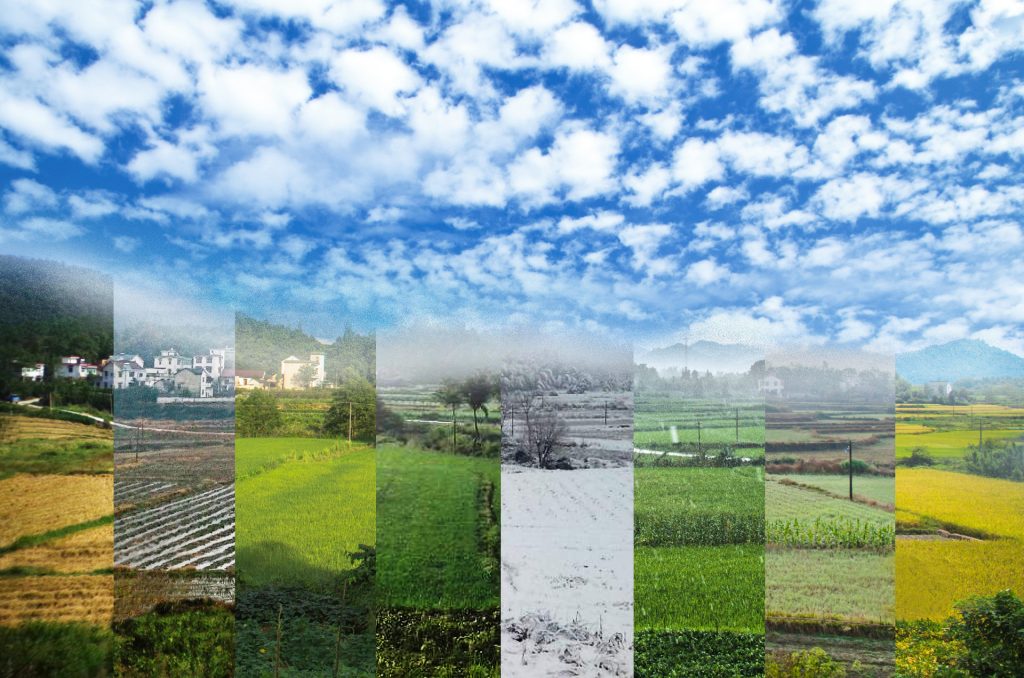China has a diverse climate due to its vast territory and varied topography. Broadly speaking, China experiences four distinct seasons: spring, summer, autumn, and winter. However, the climate can vary significantly from region to region. Here’s a general overview of the climate in different parts of China:
- Northern China: Northern China typically has a temperate continental climate with hot summers and cold winters. Cities like Beijing and Tianjin experience hot, humid summers with temperatures often exceeding 30°C (86°F) and cold, dry winters with temperatures dropping below freezing, sometimes as low as -20°C (-4°F). Spring and autumn are relatively short transitional seasons.
- Eastern China: Eastern China, including cities like Shanghai and Nanjing, has a subtropical climate characterized by hot, humid summers and mild, damp winters. Summers can be extremely hot and humid, with temperatures often reaching over 35°C (95°F), while winters are cool and damp, with temperatures rarely dropping below freezing.
- Southern China: Southern China, including regions like Guangzhou, Hong Kong, and Hainan Island, has a tropical or subtropical climate with high temperatures and heavy rainfall. Summers are hot and humid, with temperatures often exceeding 30°C (86°F), while winters are mild and relatively dry. Heavy rainfall, especially during the summer monsoon season, can lead to flooding in some areas.
- Western China: Western China, including the Tibetan Plateau and regions like Xinjiang and Gansu, has a diverse climate due to its varied topography. In general, western China experiences a continental climate with hot summers and cold winters, but temperatures and precipitation levels can vary greatly depending on altitude and proximity to mountain ranges.
- Northwestern China: Northwestern China, including areas like Inner Mongolia and Gansu Province, has a desert or semi-arid climate with hot summers and cold winters. Summers are typically hot and dry, with temperatures often exceeding 30°C (86°F), while winters are cold and dry, with temperatures dropping below freezing.
- Northeastern China: Northeastern China, also known as Manchuria, experiences a temperate continental climate with long, cold winters and short, hot summers. Cities like Harbin and Changchun are known for their bitterly cold winters, with temperatures often plummeting well below freezing, sometimes reaching as low as -30°C (-22°F).
Overall, China’s climate varies widely from region to region, offering a diverse range of weather conditions and landscapes for both residents and visitors to experience.
The impact of climate on international students in China can be multifaceted, affecting various aspects of their experience. Here are several ways in which climate can influence international students:
- Weather Adaptation
- Health Concerns
- Transportation Disruptions
- Cultural Activities and Exploration
- Housing Conditions
- Academic Performance
Weather Adaptation
Weather adaptation is crucial for international students studying in China, given the country’s diverse climate. Here are some tips for weather adaptation:
- Before arriving in China, research the climate of your specific destination.
- Pack clothing suitable for the climate of your host city. This may include lightweight and breathable clothes for hot summers and warm layers for cold winters. Don’t forget to bring rain gear and an umbrella for rainy seasons.
- Adapt your daily routine to the weather conditions. For example, plan outdoor activities for milder weather and indoor activities during extreme heat, cold, or rain. Be flexible and willing to make changes based on the forecast.
- Drink plenty of water, especially during hot and humid weather, to stay hydrated. Carry a water bottle with you when exploring outdoors. Avoid excessive alcohol and caffeine consumption, as they can contribute to dehydration.
- Use sunscreen with a high SPF to protect your skin from the sun’s harmful UV rays, especially during the summer months. Wear sunglasses and a wide-brimmed hat for additional protection. Seek shade during peak sunlight hours, typically between 10 AM and 4 PM.
- Stay updated on weather forecasts and advisories for your area. Weather conditions can change rapidly, so regularly check local weather reports and plan accordingly. Be aware of any extreme weather warnings and take appropriate precautions.
- Utilize public transportation options, such as buses and subways, to avoid walking long distances in extreme weather conditions. Familiarize yourself with the public transportation system in your city and plan your routes accordingly.
- Don’t hesitate to seek support from university staff, fellow international students, or local residents if you have questions or concerns about weather adaptation. They can provide valuable advice and assistance based on their experiences living in China.
Health concerns
Climate-related health concerns for international students in China can vary depending on the region and prevailing environmental conditions. Some of the key climate-related health concerns include:
- Many cities in China, especially in industrialized regions and densely populated urban areas, suffer from high levels of air pollution. Exposure to pollutants such as particulate matter (PM2.5), nitrogen dioxide (NO2), and sulfur dioxide (SO2) can contribute to respiratory problems, exacerbate asthma and allergies, and increase the risk of cardiovascular diseases. International students may need to take precautions such as wearing masks, staying indoors during periods of high pollution, and using air purifiers in their accommodations.
- Certain regions of China experience extreme temperatures, ranging from hot and humid summers to cold and dry winters. Prolonged exposure to extreme heat can lead to heat-related illnesses such as heat exhaustion and heatstroke, while cold temperatures can increase the risk of hypothermia and frostbite. International students should take appropriate measures to stay hydrated, dress in layers during cold weather, and avoid prolonged exposure to extreme temperatures.
- Pollen allergies and seasonal respiratory conditions such as hay fever can be triggered by changes in seasonal vegetation and environmental factors. International students may experience allergic reactions to pollen, mold spores, and other allergens present in the environment during certain times of the year. It’s essential to monitor pollen counts, take allergy medications as needed, and seek medical advice if symptoms persist.
- In some regions of China, water quality may be a concern, especially in rural areas or areas with inadequate sanitation infrastructure. Contaminated water sources can harbor pathogens such as bacteria, viruses, and parasites, increasing the risk of waterborne diseases such as gastroenteritis, hepatitis, and typhoid fever. International students should drink only purified or bottled water, avoid consuming untreated tap water, and practice good hygiene to prevent waterborne illnesses.
- Natural disasters such as earthquakes, floods, landslides, and typhoons can pose significant health risks to international students living in affected areas. It’s essential to familiarize oneself with emergency procedures, evacuation routes, and safety protocols in the event of a natural disaster.

Transportation Disruptions
Transportation disruptions due to climate-related events can affect international students in China in various ways. Here are some potential scenarios and their impacts:
- During the typhoon season, especially in coastal regions like Guangdong and Fujian provinces, heavy rainfall and strong winds can lead to flooding, landslides, and infrastructure damage. This may result in the suspension or cancellation of flights, trains, buses, and other modes of transportation, disrupting travel plans for international students.
- In northern and western regions of China, particularly during winter months, snowstorms and icy conditions can disrupt transportation networks, including highways, railways, and airports. Delays or cancellations of train services, flight cancellations, and road closures may occur, affecting the ability of international students to travel within or outside China.
- Extreme heatwaves or cold snaps can affect transportation systems and infrastructure. High temperatures may lead to overheating of train tracks, causing delays or speed restrictions on rail services. Conversely, severe cold weather may result in frozen or damaged equipment, affecting the reliability and efficiency of transportation services.
- Climate-related events such as heavy rainfall or snowfall can exacerbate traffic congestion in urban areas, leading to road closures, accidents, and delays in public transportation services. International students relying on buses, subways, or taxis may experience longer travel times and difficulties reaching their destinations during periods of inclement weather.
- Transportation disruptions caused by climate-related events can pose safety risks to international students, particularly if they are stranded or unable to access reliable transportation options. It’s essential for students to stay informed about weather forecasts, road conditions, and travel advisories to minimize risks and prioritize safety during adverse weather conditions.
Cultural Activities and Exploration
Climate can significantly influence the types of cultural activities and exploration opportunities available to international students in China. Here’s how:
- China hosts numerous cultural festivals and events throughout the year, many of which are tied to seasonal changes and weather conditions. For example, during the Spring Festival (Chinese New Year), international students can experience traditional celebrations such as dragon dances, lantern festivals, and temple fairs. Other outdoor events, such as the Mid-Autumn Festival and various regional harvest festivals, offer opportunities to immerse oneself in Chinese culture and traditions.
- China boasts a wealth of historical and natural landmarks, ranging from ancient temples and imperial palaces to picturesque mountains and scenic landscapes. The climate can influence the accessibility and appeal of these attractions. For instance, spring and autumn are ideal seasons for visiting historical sites and hiking in scenic areas, as the weather is generally mild and comfortable. Summer can be a good time for exploring coastal areas and enjoying water-based activities, while winter may be suitable for experiencing winter sports in northern regions.
- China’s vibrant cities offer diverse cultural experiences, including art galleries, museums, theaters, and culinary adventures. The climate can impact the outdoor exploration of urban centers, with milder weather in spring and autumn conducive to walking tours, street food markets, and outdoor performances. Summer may be a time for indoor cultural activities to escape the heat, while winter offers opportunities for festive shopping, ice skating, and attending traditional performances like Peking Opera or acrobatics shows.
- Climate-related traditions and customs play a significant role in Chinese culture. For example, the Dragon Boat Festival, held in early summer, involves dragon boat races and eating sticky rice dumplings (zongzi) to commemorate the poet Qu Yuan. Similarly, the Qingming Festival (Tomb-Sweeping Day) in spring involves paying respects to ancestors by visiting gravesites and enjoying outdoor picnics. International students can participate in these cultural practices and gain insights into Chinese heritage and values associated with different seasons.
- China’s diverse geography includes rural areas and ethnic minority communities with unique cultural traditions and lifestyles. International students interested in cultural immersion and rural experiences can explore villages, homestays, and ethnic minority regions. The climate may influence agricultural activities, festivals, and cultural practices in these areas, providing opportunities for meaningful exchanges and cross-cultural learning.

Housing Conditions
Climate can indeed impact housing conditions for international students in China. Here are some considerations:
- In regions with cold winters, such as northern China, housing units are typically equipped with heating systems to keep residents warm during the colder months. Central heating or individual heating units may be common in apartments and dormitories. Conversely, in southern regions with hot and humid summers, air conditioning becomes essential for maintaining comfortable indoor temperatures.
- The quality of insulation and energy efficiency of housing units can vary, affecting indoor comfort levels and energy costs. Well-insulated buildings with energy-efficient heating and cooling systems can provide better thermal comfort and reduce energy consumption, especially during extreme weather conditions.
- Proper ventilation is essential for maintaining indoor air quality and reducing the risk of indoor air pollution, particularly in urban areas with high levels of outdoor air pollution. International students should ensure that housing units have adequate ventilation systems or access to fresh air to mitigate the impact of indoor pollutants and allergens.
- In humid climates, such as southern China, controlling indoor humidity levels is crucial for preventing mold growth and maintaining indoor air quality. Housing units may be equipped with dehumidifiers or air conditioning systems with dehumidifying functions to regulate humidity levels and improve comfort.
- Proper weatherproofing and sealing of windows, doors, and building envelopes are essential for protecting housing units from outdoor elements such as rain, wind, and temperature fluctuations. International students should ensure that their accommodations are properly sealed to prevent drafts, water leakage, and heat loss during inclement weather.
- Housing conditions may be influenced by the risk of natural disasters such as earthquakes, floods, and typhoons in certain regions of China. It’s essential for international students to be aware of potential hazards and safety measures, such as earthquake-resistant building designs and emergency evacuation procedures, to ensure their safety in case of emergencies.
Academic Performance
Climate can indirectly impact the academic performance of international students in China through various factors. Here’s how climate can influence academic performance:
- Extreme weather conditions, such as heatwaves or cold snaps, can affect the physical health and well-being of international students. Heat-related illnesses, colds, or seasonal affective disorder (SAD) during long, dark winters can impact students’ ability to concentrate, attend classes regularly, and perform academically.
- Extreme temperatures, noise pollution, or discomfort due to inadequate heating or cooling in accommodations can disrupt students’ sleep patterns. Poor sleep quality or insufficient sleep can impair cognitive function, memory consolidation, and information processing, leading to reduced academic performance.
- : Climate-related stressors, such as extreme weather events, air pollution, or seasonal changes, can contribute to increased stress levels and mental health issues among international students. Anxiety, depression, and mood disturbances may impact students’ ability to focus, study effectively, and perform well academically.
- Severe weather conditions, transportation disruptions, or health-related issues may result in absenteeism or reduced participation in classes, lectures, or academic activities. Missed opportunities for learning, collaboration, and engagement with course material can hinder academic progress and achievement.
- International students, particularly those from countries with different climates, may face challenges in adapting to the climate of their host country. The process of acclimatization, adjusting to new weather patterns, and coping with climate-related stressors can impact students’ overall well-being and academic adjustment.


